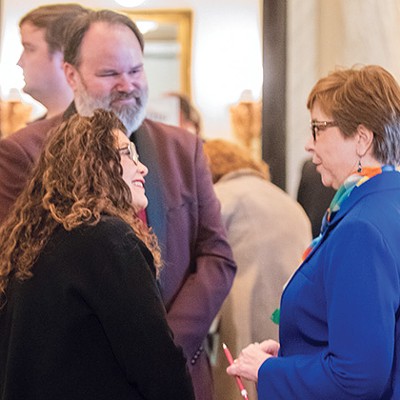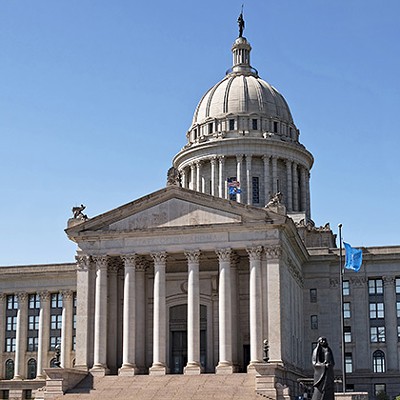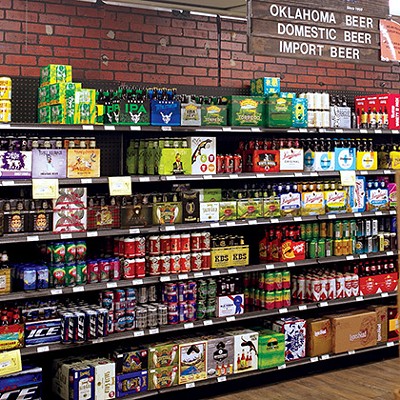A new ethics rule intended to crack down on the direct influence between lobbyists and legislators may have some unintended consequences.
In July, a new rule was enacted by the Oklahoma Ethics Commission that lowered the limit a lobbyist can spend buying gifts and meals for elected officials. The limit went from $300 per year to $100.
The intent from the Oklahoma Ethics Commission was to level the playing field between those with money and access and ordinary citizens who can't afford to buy expensive items and lunches when visiting their representative. One of the main methods lobbyists employed to win over elected officials was paying for a nice meal. Lobbyists had a good chance of getting their points across over a steak at Jamil's Steakhouse or barbecue at Iron Starr BBQ. Now, legislators may have to settle for McNuggets.
"It is causing everyone to adjust their budgets," said H.J. Reed, a lobbyist for ConocoPhillips.
The new rule came after some commissioners voiced concern about the amount of money lobbyists were spending, and what the money was being spent on. According to a report put out by the commission staff, more than $200,000 was spent during 2007 on everything from cups of coffee to University of Oklahoma football tickets. Most of the money was used during the legislative session, which runs from February through May.
"I get taken to lunch or dinner at least once or twice a week during session," said Sen. Ken Corn, D-Poteau.
MAJOR SETBACK
Having the number of free meals cut back may not be a big concern for Corn and his colleagues, but for Greg Gawey, it's a major setback.
"It will adversely affect our business, no question about it," said Gawey, owner of Jamil's Steakhouse. His restaurant, just a straight shot north up Lincoln Boulevard from the state Capitol, is a frequent hot spot for power lobbying lunches.
"It will obviously take some of the dollars out of our restaurants or entertainment. That's pretty vital the way things are right now."
The rule was proposed in 2007, but didn't go into effect until this past summer. The process involves having the commission discuss, debate and take public comments on a proposal before the end of a calendar year. In January, the commission votes on the proposal.
If it passes, the rule does not go into effect until the next fiscal year, which starts July 1. Before then, the Legislature and the governor have the option to reject or amend the rule. If no action is taken, the proposal automatically goes into effect.
Commissioner Don Bingham said that at no point before the spending limit rule went on the books did he hear any concerns about hurting the restaurant industry.
"It wasn't a factor in my mind," Bingham said. "Had anyone raised that factor, I would have expressed my regret if that turns out to be the effect of it. But ultimately, I would have voted the same way."
Some of the first figures show a slight impact. During the first half of 2008, lobbyists spent more than $81,280 on gifts and meals with elected officials. That's a nearly 62 percent decrease from the first half of 2007. Those months include the time when the Legislature is in session.
TWO-THIRDS
Of the total funds lobbyists spend, more than two-thirds go toward meals. The amount spent buying breakfasts, lunches and dinners has dropped by 20 percent between the same filing periods in 2007 and 2008.
Jim Hopper, president of the Oklahoma Restaurant Association, said the drop in spending contributes to the other setbacks.
"When you add this new rule on top of increased food prices, a slowing economy, increases in the minimum wage and other challenges facing the restaurant industry, it can't help but have a negative impact," Hopper said. "This is just another instance of government regulations having unintended consequences on small business."
There could be further consequences down the road. The ethics commission is considering another rule which would outright ban lobbyists from purchasing meals for elected officials. Sponsored events, such as a legislative breakfast by an organization where several officials were invited, would still be legal.
"It has already been lowered from $300 to $100 in July, so let's let that rule proceed to evaluate it before moving to this rule," lobbyist Pat Hall said to the commission during a recent meeting. "Scott Cooper











